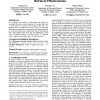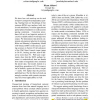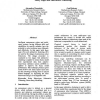501 search results - page 65 / 101 » Improving Language Models by Clustering Training Sentences |
CIKM
2009
Springer
14 years 2 months ago
2009
Springer
We investigate the problem of determining the polarity of sentiments when one or more occurrences of a negation term such as “not” appear in a sentence. The concept of the sco...
ACL
2012
11 years 10 months ago
2012
We present a novel algorithm for multilingual dependency parsing that uses annotations from a diverse set of source languages to parse a new unannotated language. Our motivation i...
EMNLP
2009
13 years 5 months ago
2009
We have designed, implemented and evaluated an end-to-end system spellchecking and autocorrection system that does not require any manually annotated training data. The World Wide...
ACL
2010
13 years 6 months ago
2010
We show how web mark-up can be used to improve unsupervised dependency parsing. Starting from raw bracketings of four common HTML tags (anchors, bold, italics and underlines), we ...
EUSFLAT
2001
13 years 9 months ago
2001
Intelligent autonomous robots and multiagent systems, having different skills and capabilities for specific subtasks, have the potential to solve problems more efficiently and eff...



